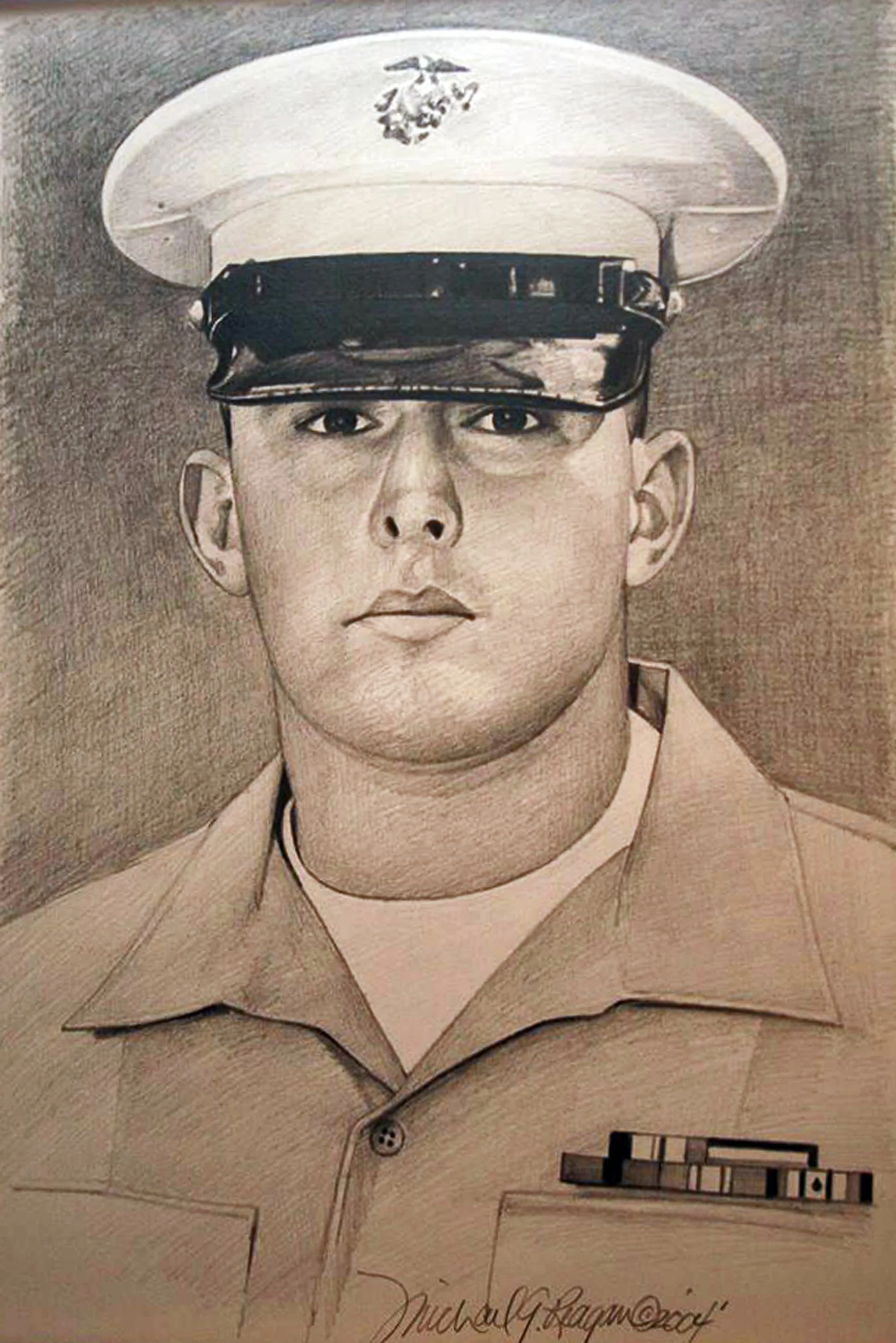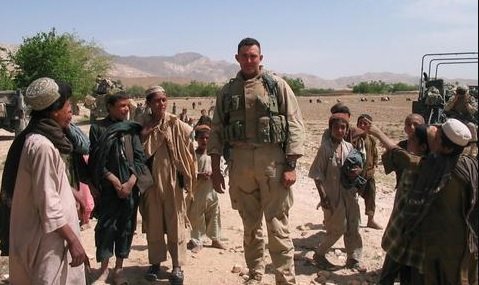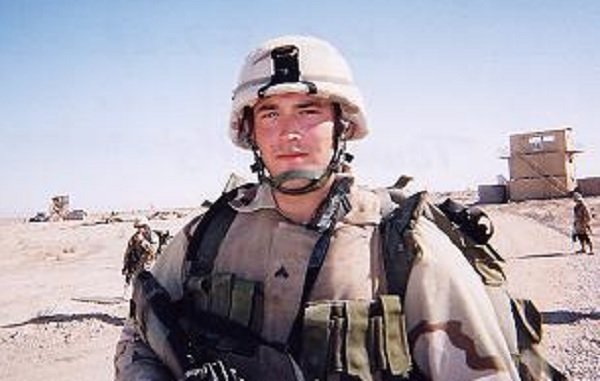Ron Payne, Corporal
Corporal Ron Payne
December 31, 1980-May 7, 2003
KIA, Afghanistan
Instead of putting Ron’s obituary here, we are posting the article from June 17, 2023 when the United States post office in Lakeland, FL was renamed in honor of Corporal Ronald Payne. The original story can be found here.
The United States Post Office in South Lakeland has a new name, one that means bravery under fire, valor, honor and sacrifice: The U.S. Marine Cpl. Ronald Payne, Jr., Post Office.
Payne died in combat in Afghanistan on May 7, 2004, as he saved the life of his best friend.
On Friday, U.S. Rep. Scott Franklin, Payne’s father Ron Payne, Sr., and his platoon commander, Col. John Kinitz, were on hand as a plaque was unveiled at the South Lakeland Post Office off South Florida Avenue.
“Corporal Payne was a shining example of the best America has to offer,” said Franklin, R-Lakeland, who sponsored the legislation to honor Payne. On December 27, 2022, President Biden signed Franklin’s bill into law.
“The impact of his selfless service on this country and on those who knew him continues to this day,” Franklin said. “It is an honor to rename this post office in his honor, so his legacy and sacrifice lives on for current and future generations in our community.”
Payne’s family legacy includes a father, grandfather and three uncles who were all Marines.
Payne was born on New Year’s Eve, 1980, in Lakeland and graduated from Mulberry High School in 1999 before enlisting in the Marines Corps after the terrorist attacks on Sept. 11, 2001. The 6-foot-7 Marine, whom friends and family called a “gentle giant,” deployed in 2003 during the initial invasion of Iraq, reaching Baghdad and earning a presidential citation along with his unit.
As an experienced combat leader, he volunteered for a second deployment, this time to Afghanistan and was assigned to the 2nd Light Armored Reconnaissance, 2nd Marine Division, 2nd Marine Expeditionary Force out of Camp LeJeune, N.C.
Death in Combat
His stepmopther, Aileen Payne, 60, described what happened to the Marine she raised the night the 23-year-old Lakeland native died.
Payne was serving as a reconnaissance scout leader with his best friend, Sgt. Jason Thompson. It was about 7:30 in the evening on May 7, 2004, well past dusk. Their job was to leave their base, survey the area, and return to get reinforcements once they knew what was going on in the dusty village of Tawara, Afghanistan, in the hills of the Kandahar Province. What they didn’t know was that two Taliban leaders were meeting in the village that night.
They encountered a shepherd boy, tending to his flock of sheep. They patted him down and then, finding nothing, let him go on his way, not realizing that the shepherds had started tying cellphones around the necks of their sheep in order to hide them from U.S. military personnel. Those who were there later told Payne’s family that the boy most likely called the Taliban to warn them that there was a U.S. military patrol.
They reconnected with men from their unit when Navy Corpsman Robert Spejcher noticed a man on a ridge. Payne motioned for them to watch the man and when the man bent down, Payne got his men behind a boulder.
Thompson stepped out from behind the boulder and ordered the man to get his hands up. Instead, the man pulled out a Russian AK-47 and shot Thompson. Payne shot the man, but then another Taliban fighter came over the hill and Payne shot him, too, before taking cover with his unit.
“They were coming like ants over the hill,” a Marine later told the family.
Thompson was wounded and pinned down and Spejcher couldn’t get to him, so Payne stepped out from behind the boulder to shoot at the enemy pouring over the ridge. Spejcher was able to grab Thompson and pull him to safety, as Payne managed to get out a radio call that they had contact.
But that’s when Payne was shot in the neck.
“Once he was down, the corpsman was trying to find the wound,” Aileen Payne said. “It was at night, he couldn’t see – he was pushing up a plate on his neck.”
And then one of the Taliban launched a rocket-propelled grenade, which hit the boulder. It knocked out the corpsman’s eardrums.
When Spejcher looked around, he could see that Payne had been killed.
“Doc Spejcher said Ron had passed at that time,” she said.
The reinforcements Payne had called for arrived and scrambled up the hill. They went on a search for the men who killed Payne. At the time, the U.S. military had issued decks of playing cards to servicemen with the faces of prominent Taliban leaders on them. That night, they found four men, including one man with his face on a card, killing all of them.
“They feel like Ron’s unit kept a lot more people from dying,” Aileen Payne said.
Payne was the first casualty Col. Kinitz, who was at Friday’s dedication, suffered. But as Payne died in Afghanistan, Kinitz’s son was born in the United States.
“One went to heaven and one came here,” she said. “We developed an extremely close relationship with him. Ron was a Christian and that was the day the Lord chose to take him home. We kept up with Will – that’s his son’s name – and Will joined the Marine Corps. He learned about Ron through his dad and he decided he wanted to follow in his Dad and Ron’s footsteps. He’s in Virginia. He’s trying to get into the security detail for the White House.”
Aileen Payne said she clearly remembers the moment the two Marines came to their front door to tell them their son had died.
The Paynes eventually created a mission to honor Gold Star military families in memory of the corporal, helping more than five dozen over the years who suffered the same grief they did.
The Marines posthumously awarded Payne a bronze star with valor, one of the military’s highest honors, and presented his family with a Purple Heart at his funeral in Lakeland’s Oak Hill Cemetery.
According to a story in the Associated Press in 2004, during a Memorial Day celebration in 2003, Payne gave a speech in Lakeland in which he said that freedom is “paid for with blood.” The video of that speech was played at his funeral.



